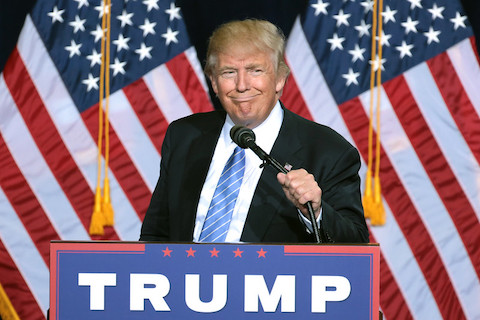
23 May Experts Discuss Potential Rise of Authoritarianism, Demise of Democracy in the U.S.

The Trump administration’s open defiance of court orders is one sign of the nation’s move away from democratic norms.(“Donald Trump” by Gage Skidmore / Flickr / CC BY-SA 2.0 license)
By Malcolm Marshall
As President Donald Trump asserts his powers are absolute, concerns are mounting that the United States is heading toward authoritarianism — and the end of democracy, as we know it.
That possibility was the focus of a recent news briefing hosted by America Community Media (formerly Ethnic Media Services) in which a panel of experts explored signs of democratic backsliding in the U.S.
The panel featured Lucan Ahmad Way, a distinguished professor of democracy at the University of Toronto; Aziz Z. Huq, a professor of law at the University of Chicago; and Gloria J. Browne-Marshall, a professor of constitutional law at John Jay College of Criminal Justice.
Way, who focuses on global patterns of democracy and dictatorship, said that before Trump was inaugurated, he anticipated a gradual erosion of democratic norms akin to what has occurred in Hungary and Poland — an erosion he expected to be a “slow and legalistic” process. But what has transpired is much more dramatic and rapid.
“This is really much more rapid effort at imposing authoritarianism than we’ve seen in places like Hungary, Turkey, India, any of those places, actually,” said Way. “Also, the sort of open disregard for the courts and court rulings and legality, that was quite surprising.”
Huq noted a pattern of defiance toward the judiciary — particularly around immigration and government spending. “In the first few months, we’ve seen both partial non-compliance with court orders and a broad ranging both rhetorical and legal attack on the court system,” Huq said.
“In response to pressure from the courts, we’ve seen not just rhetorical attacks from the White House, from its congressional allies but also attacks from private parties associated with the president’s political movement that have picked out certain judges and certain members of those judges’ families for public contempt and threats of perhaps something worse.”
“It’s important to see the pattern of non-compliance in the context of a broader campaign to discourage or scare federal judges into not issuing orders adverse to the administration,” Huq said.
Browne-Marshall argued that the United States has long experienced constitutional crises —particularly in its treatment of African Americans and other marginalized communities.
“When we think about the abuses of power, we understand that we had grown used to these methods of undermining citizenship and constitutional protections when it came to people of African descent and other communities, that it had been politically or economically marginalized,” she said. “But it was always assumed in this country that it would have a limit there.”
Instead, she said, the nation grew numb to the cries of those people and in many ways, very dismissive. “So now we see that the practice of constitutional crisis that was applied there is now spreading being expanded to other groups.”
Her warning comes as public concern continues to grow. Recent Bright Line Watch surveys of more than 500 political scientists and 2,000 members of the general public found the vast majority of people believe the United States is quickly moving away from a liberal democracy toward some form of authoritarianism.
Browne-Marshall pointed to recent events on college campuses and federal crackdowns as signs of authoritarianism such as the Tufts’ student taken away in handcuffs by people wearing masks. The student, Rumeysa Ozturk of Turkey, was released from immigration custody on bail following a judge’s order May 9 — six weeks after the masked ICE agents took her.
When something like that happens, Browne-Marshall said there can be a tendency to think, ‘but that’s just the immigrant student,’ ” and “it’s always the assumption that the person who is being undermined as far as their constitutional rights has done something to deserve it.”
The erosion of rights doesn’t stop there, she continued. It can end up affecting foreign students, citizens and, eventually, students, in general.
And, she added, we can’t be sure if the students are citizens or not in the first place.
Many Americans are only now recognizing the danger that others have long experienced, she said. “Those who voted for Trump are saying, well, we’re used to those people. Maybe the sexual orientation group, the Black group, the Latino group, the immigrant group. But as we watch the expansion of the abuse of power, it’s frightening that we were, indeed, as I said in 2023 the canary in the mine.”
Way also discussed competitive authoritarianism and how the nature of authoritarian regimes has changed in the past 50 years. “[We] used to sort of see kind of military coups, you know, Chile in 1973, but today, 63% of dictators are elected today,” he said. “So it’s really different type of dictatorship, and this is what we call competitive authoritarianism.”
“These are cases like Hungary, Turkey, India, where you do have regular elections, right? And there’s opposition that’s allowed to campaign openly and sometimes even win elections so … the sort of normal person on the street [can] think, well, this is a democracy.”
Way said these regimes employ less obvious forms of control. “What goes on is a whole series of more subtle types of — often legal or semi-legal — abuse.” That could include defamation suits or online harassment, for example.
These methods increase the costs of opposition, he said.
“And create what we have today in the United States, which is, unambiguously competitive authoritarianism,” he said.
“And you know, democracy is very much over.”





No Comments